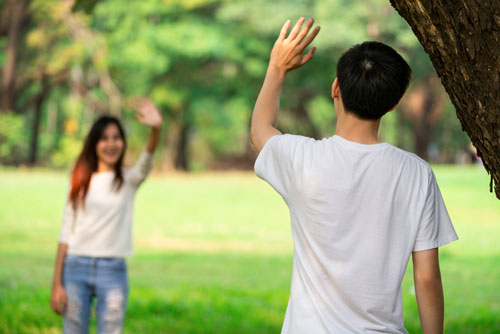Two weeks ago, most of us had never heard of the term “social distancing.” But now, we’re told it’s our best hope for saving ourselves and those around us from coronavirus.
But what does social distancing really mean?
One thing it doesn’t mean is to simply lock yourself behind closed doors until the pandemic is over. Not only is that impossible for most people, it’s not necessary or healthy.
As we hunker down in an effort to defeat the virus, here are dos don’ts for social distancing.
Do: Stay away from groups of people…even if they are fewer than 10.
Avoiding other people is the definition of social distancing. Federal guidelines first recommended staying out of groups of 50 or more. But the limit has since been lowered to 10.
Dr. Debra Birx, who is coordinating the federal response, said the change was due to new research showing that smaller groups caused the virus to spread far slower than larger ones.[1]
But there is nothing magic about the number 10. You should try to keep your distance from anybody who is not a member of your household, Dr. Birx said.
Don’t: Stay inside all day.
There’s evidence that sun exposure and fresh air may actually prevent and treat viral infections like Covid-19.
Many people are comparing the coronavirus crisis to the Spanish flu pandemic of 1918 that killed some 50 million people worldwide. Dr. Richard Hobday notes that people who got sunlight and fresh air during the Spanish flu outbreak lowered their chances of getting the disease. And when they did get it, they recovered better.[2]
“Research shows that outdoor air is a natural disinfectant,” said Dr. Hobday, author of The Healing Sun. “Fresh air can kill the flu virus and other harmful germs. Equally, sunlight is germicidal.”
When you go outside, try to get as much sun exposure as possible without getting sunburned. This will help your body produce vitamin D, which strengthens immunity.
Do: Use the rule of six feet.
You may have heard that you should leave a buffer zone of six feet between yourself and other people.
This is because the virus is mainly spread through droplets that come out of an infected person’s mouth and nose. When they speak, exhale, cough, or sneeze, the droplets travel about three to six feet before gravity pulls them to the ground.
“They fall pretty quickly,” said Dr. Jill Weatherhead, an infectious disease expert at the Baylor College of Medicine in Houston.[3]
Don’t: Go to the gym.
Yes, exercise is important. And you can minimize your risk by wiping down equipment before you use it. But you’re better off taking your workout outside, away from other people until the threat passes.
Do: Spend time wiping down surfaces.
By now you’ve probably heard that you should disinfect your cellphone and other devices. Apple recommends using 70% isopropyl alcohol or Clorox disinfectant wipes. Don’t use bleach on devices.[4]
Also wipe down surfaces in your home that outsiders touch, such as the front doorknob and the mailbox. Disinfect areas that come into contact with delivered packages and mail.
It’s a good idea to disinfect your glasses as well, focusing on the nose pad. You can use soap and water or 70% isopropyl alcohol.
Don’t: Use vinegar or vodka as disinfectants.
There are widely circulated recipes on the internet using vodka or vinegar as sanitizers. But vodka does not have enough alcohol to kill viruses. Vodka is typically 80 proof, which is 40% alcohol. Tests have shown that 70% alcohol is required to kill coronavirus.
Vinegar’s acidity destroys some germs. But there is no evidence that it’s strong enough to kill coronavirus.[5]
Do: Get more sleep.
With businesses shutting down and more employees telecommuting, you may have more time on your hands. Using at least part of it to get more sleep may help you fight off the coronavirus.
In one study, researchers exposed 164 men and women to the cold virus. Not everyone got sick. Those who sleep less than six hours a night were 4.2 times more likely to become infected with the virus than those who got more than seven hours of sleep.[6]
Don’t: Disconnect from others.
Social distancing doesn’t mean social isolation. Use the extra time you have during the shutdown to connect with family, friends, and others you care about through phone calls, emails, or text messages.
“When there’s a time of anxiety, that is not a time to pull back from connectedness,” said Dr. Franklin Watkins. He’s an associate professor in geriatric medicine at Wake Forest Baptist Health in Winston-Salem, North Carolina.
“Now’s a time that we actually need to lean into social connectedness and lean into our family members and our friends and acquaintances.”
Connecting with others, even though we can’t do it face-to-face, reduces stress, which contributes to stronger immunity, Dr. Watkins said.
Social distancing doesn’t mean becoming a shut-in. Done right, it can actually be an opportunity to improve your health and strengthen your connection to loved ones while keeping yourself safe from the coronavirus.
Editor’s
Note: If you’re worried about
the coronavirus outbreak, you need to know about “infinite immunity.” It’s a
recent Nobel Prize-winning discovery that gives your body the power to fight
off most infections. You can find out more by reading our monthly journal, Independent
Healing. Go HERE.
Like this Article? Forward this article here or Share on Facebook.
[1] https://apnews.com/fa1fda126fe191425abc20ab461dfbe7
[2] https://medium.com/@ra.hobday/coronavirus-and-the-sun-a-lesson-from-the-1918-influenza-pandemic-509151dc8065
[3] https://apnews.com/fa1fda126fe191425abc20ab461dfbe7
[4] https://support.apple.com/en-us/HT207123
[5] https://www.consumerreports.org/cleaning/common-household-products-that-can-destroy-novel-coronavirus/
[6] https://www.nytimes.com/2020/03/10/well/live/can-i-boost-my-immune-system.html?action=click&module=Spotlight&pgtype=Homepage

